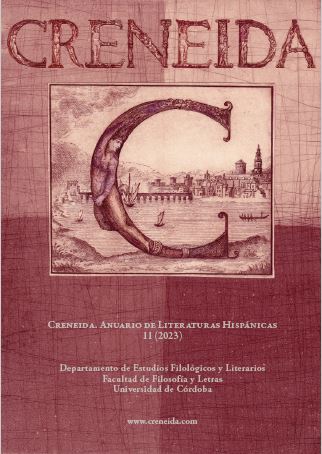Autobiography by Omission: a Clean-Line Family Portrait in Nadia Hafid’s El buen padre (2020).
Main Article Content
Abstract
The title of Nadia Hafid’s first graphic novel (Nadia Hafid, El buen padre, Barcelona, Sapristi Editorial, 2020) is a declaration of respect and understanding, a tag —in capital letters and without nuance— that rejects bitterness: the good father. The story is one of abandonment: the capitulation of a father, a Moroccan immigrant, who returns to his country leaving behind his wife
and three children. Some pages document with simplicity the reality of immigration —between defeat and violence— and the entrenched situation of those who are unable to take root. But beyond the father figure alone, the author draws a family portrait that deals with the complexities of absences, losses, and personalities shaped by these inheritances and wounds. Nadia Hafid’s work is clearly autobiographical in nature. This article proposes to analyse how the author works with the autobiographical genre, exploring new forms of narration and using an original graphic language. The study explores the way in which graphic sobriety allows the absence of a father whose spectral figure runs through the entire work to be captured.
Downloads
Publication Facts
Reviewer profiles N/A
Author statements
- Academic society
- Creneida. Anuario de Literaturas Hispánicas
Article Details

This work is licensed under a Creative Commons Attribution-NonCommercial-NoDerivatives 4.0 International License.
Avisos de derechos de autor propuestos por Creative Commons
1. Política propuesta para revistas que ofrecen acceso abierto
Aquellos autores/as que tengan publicaciones con esta revista, aceptan los términos siguientes:- Los autores/as conservarán sus derechos de autor y garantizarán a la revista el derecho de primera publicación de su obra, el cuál estará simultáneamente sujeto a la Licencia de reconocimiento de Creative Commons que permite a terceros compartir la obra siempre que se indique su autor y su primera publicación esta revista.
- Los autores/as podrán adoptar otros acuerdos de licencia no exclusiva de distribución de la versión de la obra publicada (p. ej.: depositarla en un archivo telemático institucional o publicarla en un volumen monográfico) siempre que se indique la publicación inicial en esta revista.
- Se permite y recomienda a los autores/as difundir su obra a través de Internet (p. ej.: en archivos telemáticos institucionales o en su página web) antes y durante el proceso de envío, lo cual puede producir intercambios interesantes y aumentar las citas de la obra publicada. (Véase El efecto del acceso abierto).
References
Alary, Viviane, Corrado, Danielle y Mitaine, Benoit (dir.), Autobio-graphismes. Bande dessinée et représentation de soi, Genève, Georg, 2015.
Bechdel, Alison, Fun Home: una familia tragicómica, Barcelona, Random House Mondadori, 2008.
Bechdel, Alison, Fun Home, A Family Tragicomic, London, Random House, 2006.
Casillas, Elizabeth, "Parcos en palabras. Una aproximación al cómic (casi) mudo", Revistacactus.com, [en línea]: https://www.revistacactus.com/parcos-en-palabras-una-aproximacion-al-comic-casi-mudo/
Dickinson, Emily Elizabeth, Poemas, selección y traducción de Margarita Ardanaz, Cátedra, Madrid, 2004.
Escobar Fuentes, Susana, "La novela gráfica autobiográfica hecha por mujeres. Cuerpo, subjetividad y búsqueda identitaria", Revista Fuentes Humanísticas, Universidad Autónoma Metropolitana Azcapotzalco, 32, 60 (2020) [en línea]: http://revistastmp.azc.uam.mx/fuenteshumanisticas/index.php/rfh/article/view/984/1097 DOI: https://doi.org/10.24275/uam/azc/dcsh/fh/2020v32n60/Escobar
Groensteen, Thierry, «Un premier bouquet de contraintes», Oubapo, 1, París, L’Association, 1997.
Hafid, Nadia, El buen padre, Barcelona, Sapristi Editorial, 2020.
Hafid, Nadia, Chacales, Barcelona, Sapristi Editorial, 2022.
Masarah Revuelta, Elena, "Lecturas feministas en el cómic autobiográfico contemporáneo", Filanderas: Revista Interdisciplinar de Estudios Feministas, 1 (2016). DOI: https://doi.org/10.26754/ojs_filanderas/fil.201722305
Otero, Sole, Poncho fue, Barcelona, La Cúpula, 2017.
Peeters, Benoît, Case, planche, récit. Lire la bande-dessinée, Tournai, Casterman, 1998.
Serra, Xavi, "Nadia Hafid i la geometria de l’absència", Revista Ara, Magazín Llegim, [en línea], 20/03/2020: https://llegim.ara.cat/comic/nadia-hafid-geometria-absencia_1_1181242.html
Entrevista a Nadia Hafid. “Crec que ara les noves generacions tenen la sort de viure en un entorn molt més divers”, Museu d'Història de la Immigració de Catalunya, [en línea]: https://www.mhic.online/entrevista-a-nadia-hafid/





